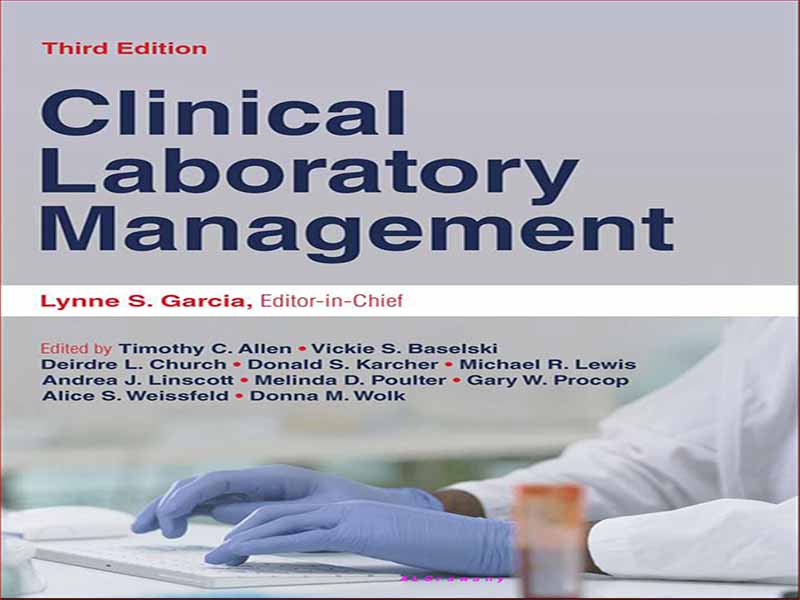- عنوان کتاب: Clinical Laboratory Management
- نویسنده: Lynne S. Garcia
- حوزه: آزمایشگاه پزشکی
- سال انتشار: 2024
- تعداد صفحه: 813
- زبان اصلی: انگلیسی
- نوع فایل: pdf
- حجم فایل: 18.2 مگابایت
محیط فعلی برای پزشکی آزمایشگاهی و آسیب شناسی همچنان دستخوش دگرگونی چشمگیری است که تحت تأثیر تغییرات قابل توجهی در بخش های قانونی، نظارتی، بازپرداخت، فناوری، جامعه شناختی، اقتصادی، ارتباطات و تجاری است. انجام تمام جنبه های پزشکی و مراقبت های بهداشتی وابسته به رویکردهای جدید و طیف وسیع تری از تخصص مدیریتی نیاز دارد. حوزههایی که انتظار میرود مدیر، مدیر یا سرپرست آزمایشگاه در آنها درک و عملکرد داشته باشد شامل منابع مالی و انسانی، آزمایش مراقبت از بیمار و مسائل مربوط به عملکرد کیفی، و پاسخگویی کلی به مدیریت مرکز است. بسیار مهم است که افرادی که در محیط مراقبت های بهداشتی کار می کنند شنیدن، صحبت کردن و درک کامل زبان عملیاتی مدیریت مراقبت های بهداشتی را بیاموزند. در طول چند سال گذشته، رشتههای پزشکی آزمایشگاهی و مدیریت آسیبشناسی شاهد تغییرات چشمگیر بسیاری از جمله موارد مربوط به تضمین کیفیت، ارتباطات، ذخیرهسازی و بازیابی دادهها، تست نقطهای، مدیریت تست، اتوماسیون، ایمنی و آمادگی اضطراری بوده است. (به ویژه با توجه به همهگیری COVID-19)، الزامات نظارتی، محرمانه بودن اطلاعات، الزامات صورتحساب و کدگذاری، تغییرات فضای فیزیکی، ادغام آزمایشگاه، کمبود برنامههای آموزشی و پرسنل آموزشدیده، آزمایش صلاحیت، نیازهای حمل و نقل نمونه، کاهش بازپرداخت ، تقاضا برای افزایش بهره وری و افزایش نیاز به مشاوره و ابتکارات آموزشی برای مشتریان. واکنشها به تغییراتی که در سالهای اخیر در محیط مراقبتهای بهداشتی رخ داده است اساساً 2 مورد است: افزایش تلاش برای مهار هزینهها و افزایش تقاضا برای مراقبتهای پزشکی مناسب و بدون خطا. هر دوی اینها تحت تأثیر چالش های پیچیده مربوط به همه گیری کووید-19 قرار گرفته اند. هدف از این متن ارائه اطلاعات و دستورالعمل های جامع و کاربردی برای مدیریت مراقبت های بهداشتی در قرن بیست و یکم برای مدیران آزمایشگاه است. مدیران؛ فناوران ارشد؛ سرپرستان؛ کارآموزان در دانشکده های مدیریت مراقبت های بهداشتی، فناوری آزمایشگاه های پزشکی و سایر رشته های بهداشتی مرتبط؛ کسانی که برای موقعیت های رهبری آموزش می بینند. و کسانی که برای دریافت گواهینامه هیئت مدیره یا ثبت در مدیریت تحصیل می کنند. این کتاب برای کسانی که در حال آموزش برای ورود به این رشته ها هستند و برای کسانی که در حال حاضر به طور فعال در آسیب شناسی بالینی و مدیریت آزمایشگاه بالینی کار می کنند طراحی شده است. این شامل یک مرور کلی از اصول مدیریت و نحوه اعمال آنها در آزمایشگاه بالینی است. تجزیه و تحلیل عمیق چالشهای مالی پیش روی آزمایشگاههای بالینی و همچنین بحثهایی در مورد شیوههای تجاری خوب گنجانده شده است. اطلاعات گسترده ای در مورد تأثیر محیط نظارتی بر هر جنبه ای از عملکرد آزمایشگاه بالینی و همچنین مدیریت پرسنل مربوط به کلیه طبقه بندی های شغلی مرتبط وجود دارد. بحثهای اضافی شامل تغییر رویه پزشکی، رهبری مدیریتی، حوزه در حال گسترش تست نقطهای از مراقبت، سیستمهای اطلاعاتی پیشرفته و الزامات امنیتی/محرمانه، انطباق با بازپرداخت، بازاریابی و گسترش خارج، آزمایشهای بالینی و پزشکی مبتنی بر شواهد، معیارسنجی، روندهای فعلی در ابزار دقیق و فناوری، مشاوره افزایش یافته از طریق گزارش های گسترده نتایج آزمایش، و آینده آزمایشگاه های بالینی. همه موضوعات فصل به طور گسترده بهروزرسانی شدهاند، بهویژه از جمله عناصری از همهگیری کووید-19، و یک بخش جدید جامع اضافه شده است تا چالشهای مدیریتی و پرسنلی خاص مرتبط با همهگیری را پوشش دهد. نویسندگان این فصلها همگی آزمایشگاههای شاغل هستند، که بسیاری از آنها تجربه گستردهای در تمام جنبههای آزمایشگاه بالینی، از جمله مسئولیتهای فنی و مدیریتی داشتهاند. هر بخش توسط متخصصان با تجربه ویرایش می شود تا شامل پوشش جامع، هم آموزشی و هم عملی، از تمام مسائل مربوط به عملیات آزمایشگاهی بالینی باشد. اطلاعات مدیریت آزمایشگاهی گسترده در یک منبع موجود است و شامل مثالهای عملی و جداول خلاصه متعددی است که به عنوان دستورالعملی برای مستندات مربوطه عمل میکند. ابزارهای مدیریتی مختلفی ارائه شده است، به ویژه مربوط به مسئولیت های پرسنلی، فنی، نظارتی و مالی. این اطلاعات برای تمام سطوح شغلی در آزمایشگاه، و همچنین برای تمام دوره های آموزشی مدیریت مراقبت های بهداشتی و فنی مرتبط است. هر فصل از قالب یکسانی پیروی می کند، که به گونه ای طراحی شده است که به راحتی از یک بخش به بخش دیگر منتقل شود. وب سایت های گسترده ای گنجانده شده اند که اطلاعات ارزشمند بیشتری را در رابطه با هر فصل ارائه می دهند.
The current environment for laboratory medicine and pathology continues to undergo dramatic transformation, which is influenced by significant changes in the legislative, regulatory, reimbursement, technologic, sociologic, economic, communication, and business sectors. The practice of all aspects of medicine and allied healthcare requires new approaches and a much broader range of managerial expertise. Areas in which a laboratory director, manager, or supervisor is expected to understand and perform include fiscal and human resources, patient care testing and quality performance issues, and overall accountability to the facility administration. It is very important that individuals working within the healthcare environment learn to hear, speak, and thoroughly understand the operational language of healthcare administration. During the past few years, the fields of laboratory medicine and pathology management have seen many dramatic changes, including those related to quality assurance, communication, data storage and retrieval, point- of- care testing, test management, automation, safety and emergency preparedness (particularly in light of the COVID- 19 pandemic), regulatory requirements, information confidentiality, billing and coding requirements, physical space changes, laboratory consolidation, shortage of training programs and trained personnel, competency testing, specimen handling and shipping requirements, decrease in reimbursement, demand for increased productivity, and increased need for consultation and educational initiatives for clients. Reactions to the changes that have occurred in the healthcare environment in recent years are essentially 2- fold: increased efforts to contain costs, and increased demand for appropriate and error- free medical care. Both of these have been influenced by the complex challenges related to the COVID- 19 pandemic. The purpose of this text is to provide comprehensive, practical information and guidelines for healthcare management in the 21st century for laboratory directors; managers; chief technologists; supervisors; trainees in schools of healthcare administration, medical laboratory technology, and other allied health disciplines; those training for leadership positions; and those studying for board or registry certification in management. This book is designed for those who are training to enter these fields and for those who are already actively working in clinical pathology and clinical laboratory management. It contains a comprehensive overview of management principles and how they apply to the clinical laboratory. In- depth analysis of the financial challenges facing clinical laboratories is included, as are discussions on good business practices. There is extensive information on the impact of the regulatory environment on every aspect of clinical laboratory practice, as well as personnel management related to all relevant job classifications. Additional discussions include the changing practice of medicine, managerial leadership, the expanding field of point- of- care testing, enhanced information systems and security/confidentiality requirements, reimbursement compliance, outside marketing and expansion, clinical trials and evidence- based medicine, benchmarking, current trends in instrumentation and technology, enhanced consultation through expanded test result reports, and the future of clinical laboratories. All chapter topics have been extensively updated, particularly including elements from the COVID- 19 pandemic, and a comprehensive new section has been added to cover the particular administration and personnel challenges associated with the pandemic. The authors of these chapters are all practicing laboratorians, many of whom have had extensive “hands- on” experience in all facets of clinical laboratory practice, including both technical and managerial responsibilities. Each section is edited by experienced professionals to include comprehensive coverage, both didactic and practical, of all issues related to clinical laboratory operations. Extensive laboratory management information is available in one resource and includes practical examples and numerous summary tables to serve as guidelines for relevant documentation. Various management tools are provided, particularly related to personnel, technical, regulatory, and financial responsibilities. This information is relevant for all job levels within the laboratory, as well as for all healthcare management and technical training courses. Each chapter follows the same format, which is designed to flow easily from one section to another. Extensive websites are included that provide additional valuable information related to each chapter.
این کتاب را میتوانید از لینک زیر بصورت رایگان دانلود کنید:
Download: Clinical Laboratory Management


































نظرات کاربران